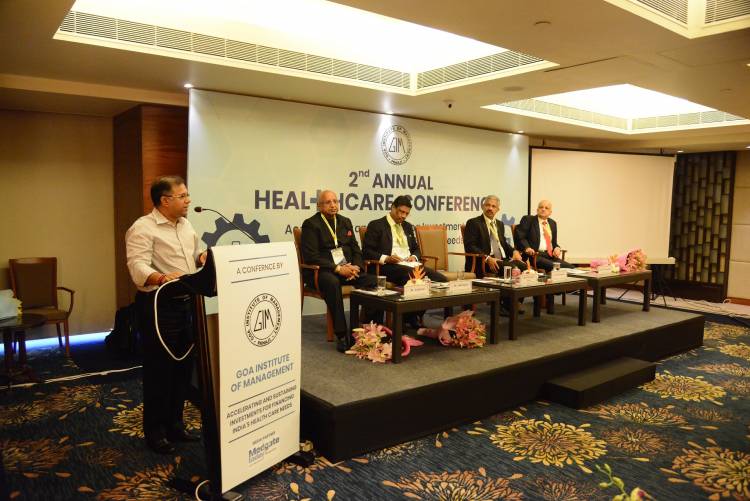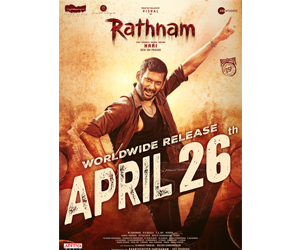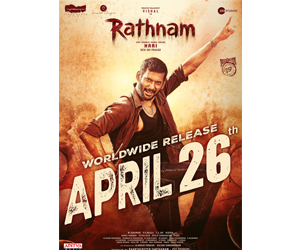Healthcare Experts and Industry Leaders debate on Financing India’s Healthcare Needs at conference by Goa Institute of Management (GIM)

India has made significant strides in healthcare over the last few decades, with key indicators of health outcomes showing marked improvement. Various government initiatives have mobilized communities on health, and large scale health financing initiatives have enabled access to the private sector for all sections of the population. However, India’s out of pocket expenditure (OOP) constitutes more than 60% of all health expenses which is a major drawback in a country like India where a large segment of the population is economically backward.
To bring clarity on the matter, Goa Institute of Management (GIM) organized a conference on the theme - Accelerating and Sustaining Investments for Financing India’s Healthcare Needs – where
thought leaders representing Government, Industry and Academia deliberated on the opportunities and challenges.
Speaking at the event said the Chief Guest Shri Vishwajit P. Rane, Hon’ble Minister of Health, Government of Goa, “Goa has been the first in many healthcare initiatives and is successfully implementing the DDSSY programme. There are challengers but there have also been learnings. And I welcome suggestions and learnings where we can improve. I request GIM to suggest solutions to us from time to time and be a knowledge partner to the Health Department. We look towards GIM to offer us researched suggestions, solutions and guidance”
He added, “NITI Ayog has offered a good framework to work within for state governments. Collaborations between the public and private entities can assist a great deal. Private medical collages can collaborate with district hospitals which will be excellent. We are also looking towards the possibility of creating efficient home care for the elderly where a community work force can be trained to offer care and support to the elderly at the local panchayat level. The elderly are often neglected and it is our responsibility to take care of them”.
Mr. Alok Kumar, Advisor, NITI Ayog, Government of India said, “Healthcare is not a T20 match. The solutions may take some time. There are drastic differences in the health systems across states within our country. We have a highly fragmented healthcare system. Therefore, for us to believe that an identical approach will work across the country is an ambitious thought. State governments need to be more proactive on finding solutions to the healthcare needs prevalent in the state and cannot expect strategy to be outsourced to the centre. Secondly we need to elevate the approach from being schematic to be systemic. There needs to be a certain elevation from being mere schemes to creating effective systems. Thirdly the roles within the health ministry ecosystem need to be clearly defined”
Hon Brig. Dr. Arvind Lal (Padma Shri), Chairman and Managing Director, Dr. Lal PathLabs stressed that greated investment in healthcare is the need of the hour. “The government has made significant strides in the healthcare space. To see greater improvements, the government needs to immediately increase the financial allocation for the dispensing of healthcare from a mere 1% out of a total of 3.9% of GDP to 2.5% of GDP. A good starting point would be to spend an extra 0.5% of GDP every year on healthcare for the next three years. Unfortunately, in the latest budget, the allocation is up only 7% against last year’s budgeted estimate and we may miss the target of the earlier stated aim of the Union Government of spending 2.5% of GDP by 2025.
Dr. Kheya Furtado, Assistant Professor of Goa Institute of Management presented findings from a WHO funded study conducted for the National Health Authority, Government of India on ‘Strategic purchasing in the Pradhan Mantri Jan Arogya Yojana through the Trust and Insurance model’. She emphasized that claim audits need to be facilitated by tools such as STGs and long- term capacities need to be built and retained in the public Trusts for management of claims. As scheme utilization increases, costs are likely to change, especially in Insurance model States due to the sharing of financial losses that may lead to larger premiums charged to States by Insurance companies. Contract terms with insurance companies must be closely monitored and address these potential changes. Differential pricing may be developed to incentivize larger hospitals to participate in the scheme. Incentives based on hospital infrastructure, location etc. may also be developed in addition to the base rate, to address supply side constraints.
Mr. R Chandrashekhar, Chairman, Centre for The Digital Future, Former Secretary Electronics & IT, GOI Former Chairman Telecom Commission and Secretary, Department of Telecom, GOI, Former President, NASSCOM in his address stressed on the need to focus on the goal which is to deliver value to society and aim for significant improvements over aiming for perfection. “Integrating innovation, value addition and regulation within a technology driven atmosphere is key to the success of implementing a process” he said.
Dr. Ajit Parulekar, Director Goa Institute of Management said “We run several cutting edge programmes and GIM’s Healthcare Programme is the finest in the country. This second edition of the conference is furthering GIM’s objective of being a management thought-promoter and providing a platform for meaningful discussions in the healthcare domain.”
Over 170 delegates from across the country, consisting of doctors, healthcare managers, academicians, researchers and students attended the event.


















